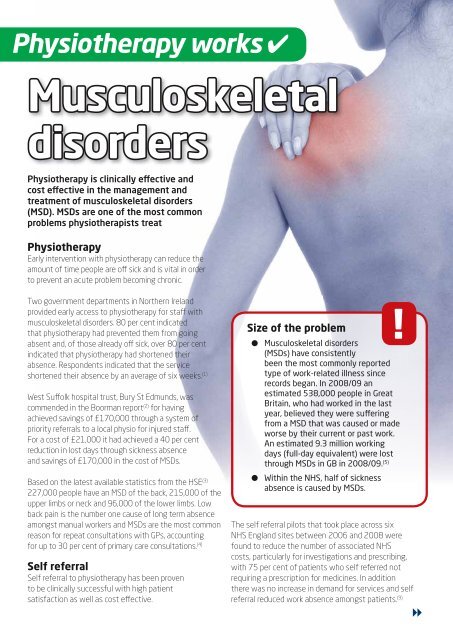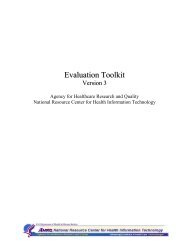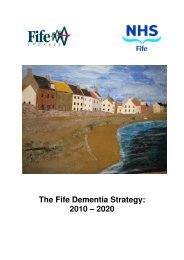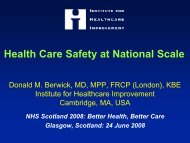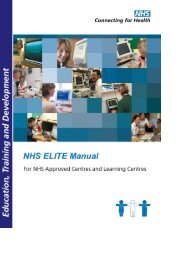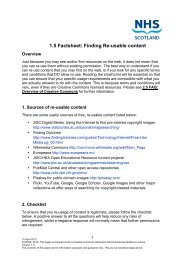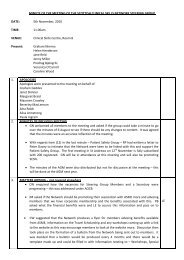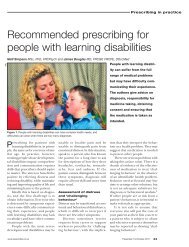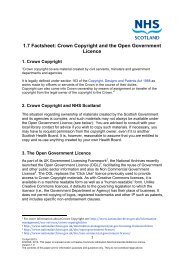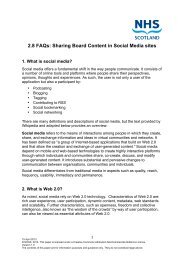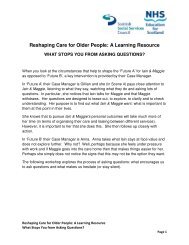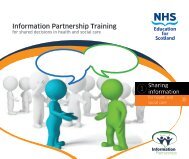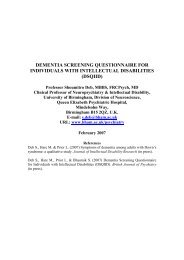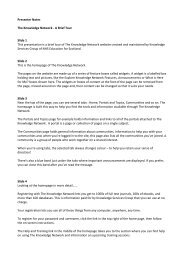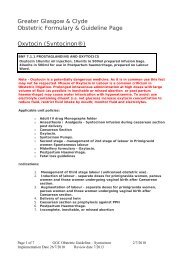UKRC Leaflet on Musculoskeletal Disorders
UKRC Leaflet on Musculoskeletal Disorders
UKRC Leaflet on Musculoskeletal Disorders
Create successful ePaper yourself
Turn your PDF publications into a flip-book with our unique Google optimized e-Paper software.
Physiotherapy works ✔<br />
<strong>Musculoskeletal</strong><br />
disorders<br />
Physiotherapy is clinically effective and<br />
cost effective in the management and<br />
treatment of musculoskeletal disorders<br />
(MSD). MSDs are <strong>on</strong>e of the most comm<strong>on</strong><br />
problems physiotherapists treat<br />
Physiotherapy<br />
Early interventi<strong>on</strong> with physiotherapy can reduce the<br />
amount of time people are off sick and is vital in order<br />
to prevent an acute problem becoming chr<strong>on</strong>ic.<br />
Two government departments in Northern Ireland<br />
provided early access to physiotherapy for staff with<br />
musculoskeletal disorders. 80 per cent indicated<br />
that physiotherapy had prevented them from going<br />
absent and, of those already off sick, over 80 per cent<br />
indicated that physiotherapy had shortened their<br />
absence. Resp<strong>on</strong>dents indicated that the service<br />
shortened their absence by an average of six weeks. (1)<br />
West Suffolk hospital trust, Bury St Edmunds, was<br />
commended in the Boorman report (2) for having<br />
achieved savings of £170,000 through a system of<br />
priority referrals to a local physio for injured staff.<br />
For a cost of £21,000 it had achieved a 40 per cent<br />
reducti<strong>on</strong> in lost days through sickness absence<br />
and savings of £170,000 in the cost of MSDs.<br />
Based <strong>on</strong> the latest available statistics from the HSE (3)<br />
227,000 people have an MSD of the back, 215,000 of the<br />
upper limbs or neck and 96,000 of the lower limbs. Low<br />
back pain is the number <strong>on</strong>e cause of l<strong>on</strong>g term absence<br />
am<strong>on</strong>gst manual workers and MSDs are the most comm<strong>on</strong><br />
reas<strong>on</strong> for repeat c<strong>on</strong>sultati<strong>on</strong>s with GPs, accounting<br />
for up to 30 per cent of primary care c<strong>on</strong>sultati<strong>on</strong>s. (4)<br />
Self referral<br />
Self referral to physiotherapy has been proven<br />
to be clinically successful with high patient<br />
satisfacti<strong>on</strong> as well as cost effective.<br />
!<br />
<strong>Musculoskeletal</strong> disorders<br />
(MSDs) have c<strong>on</strong>sistently<br />
been the most comm<strong>on</strong>ly reported<br />
type of work-related illness since<br />
records began. In 2008/09 an<br />
estimated 538,000 people in Great<br />
Britain, who had worked in the last<br />
year, believed they were suffering<br />
from a MSD that was caused or made<br />
worse by their current or past work.<br />
An estimated 9.3 milli<strong>on</strong> working<br />
days (full-day equivalent) were lost<br />
through MSDs in GB in 2008/09. (5)<br />
Size of the problem<br />
●<br />
●<br />
Within the NHS, half of sickness<br />
absence is caused by MSDs.<br />
The self referral pilots that took place across six<br />
NHS England sites between 2006 and 2008 were<br />
found to reduce the number of associated NHS<br />
costs, particularly for investigati<strong>on</strong>s and prescribing,<br />
with 75 per cent of patients who self referred not<br />
requiring a prescripti<strong>on</strong> for medicines. In additi<strong>on</strong><br />
there was no increase in demand for services and self<br />
referral reduced work absence am<strong>on</strong>gst patients. (9)<br />
<br />
?<br />
£
£<br />
! ? £<br />
Cost of MSDs<br />
●<br />
●<br />
22 per cent of people <strong>on</strong><br />
Incapacity Benefit (Employment<br />
Support Allowance) have an MSD (6)<br />
MSDs cost society approximately<br />
£7.4billi<strong>on</strong> a year. (7,8)<br />
An analysis of self referral in Scotland found that the<br />
average cost of an episode of care was established as<br />
£66.31 for a self-referral, £79.50 for a GP-suggested<br />
referral and £88.99 for a GP referral. The average cost<br />
benefit to NHS Scotland of self referral was identified<br />
as being approximately £2 milli<strong>on</strong> per annum. (10)<br />
D<strong>on</strong>caster and Bassetlaw Trust piloted<br />
a successful self referral physio<br />
service for 6500 staff in<br />
2005. The service was<br />
made permanent after<br />
an evaluati<strong>on</strong> identified<br />
potential savings of more<br />
than £330,000. It is<br />
used by employees from<br />
all corners of the trust,<br />
and it offers an average<br />
waiting time of 2.8 days.<br />
More than half the users say<br />
they would have taken time off<br />
work if the service were not available.<br />
In Cambridge, self referral for MSD outpatient services<br />
has reduced costs due to less GP use of prescribing<br />
and diagnostic tests. 75 per cent of patients who selfreferred<br />
did not require a prescripti<strong>on</strong> for medicines,<br />
giving an average saving of £12,000 per GP practice.<br />
Teleph<strong>on</strong>e assessment and support<br />
Assessing the severity of a patient’s c<strong>on</strong>diti<strong>on</strong> over<br />
the teleph<strong>on</strong>e has been found to be very resource<br />
efficient. This teleph<strong>on</strong>e triage saves patient and<br />
physiotherapist time as well as costs and ensures those<br />
needing the most urgent treatment are prioritised.<br />
Where appropriate, follow up support by teleph<strong>on</strong>e<br />
has also been found to be a clinically and cost<br />
effective way of enabling patients to self manage<br />
their c<strong>on</strong>diti<strong>on</strong>, helping to prevent relapses.<br />
An occupati<strong>on</strong>al health physiotherapy service used<br />
teleph<strong>on</strong>e triage and follow up support as part<br />
of a programme to tackle MSDs experienced by<br />
staff of NHS Lothian. Over £300,000 was saved<br />
in salaries al<strong>on</strong>e by reducing sickness absence and<br />
there was a 74 per cent reducti<strong>on</strong> in recurrence of<br />
MSDs nine m<strong>on</strong>ths following the programme. (11)<br />
C<strong>on</strong>clusi<strong>on</strong><br />
Speedy access to physiotherapy for people with<br />
MSDs is clinically and cost effective for the<br />
health service, including GPs, for employers<br />
and for society. Physiotherapists have helped<br />
to pi<strong>on</strong>eer innovative ways of providing<br />
speedy access within existing services.<br />
Further informati<strong>on</strong><br />
CSP Enquiry Handling Unit<br />
Tel: 0207 306 6666<br />
Email: enquiries@csp.org.uk<br />
Web site: www.csp.org.uk<br />
!<br />
?<br />
£<br />
References<br />
1 Northern Ireland Audit Office. Management of sickness absence in the<br />
Northern Ireland Civil Service. Report by the Comptroller and Auditor General<br />
NIA 132/07-08, 22 May 2008. Norwich: TSO (The Stati<strong>on</strong>ery Office);<br />
2008URL: www.niauditoffice.gov.uk/pubs/Absence/Absence-final.pdf<br />
2. Boorman S. NHS health and well-being review: interim<br />
report. L<strong>on</strong>d<strong>on</strong>: Department of Health; 2009 URL: www.<br />
nhshealthandwellbeing.org/pdfs/NHS%20Staff%20H&WB%20<br />
Review%20Final%20Report%20VFinal%2020-11-09.pdf<br />
3 Health and Safety Executive. Table SWIT3W12 - 2008/09.<br />
URL: www.hse.gov.uk/statistics/lfs/0809/swit3w12.htm<br />
4 Nati<strong>on</strong>al Institute for Health and Clinical Excellence. Low back<br />
pain: early management of persistent n<strong>on</strong>-specific low back pain.<br />
L<strong>on</strong>d<strong>on</strong>: Nati<strong>on</strong>al Institute for Health and Clinical Excellence; 2009.<br />
URL: www.nice.org.uk/nicemedia/live/11887/44343/44343.pdf<br />
5 Health and Safety Executive. <strong>Musculoskeletal</strong> disorders.URL: www.<br />
hse.gov.uk/statistics/causdis/musculoskeletal/index.htm<br />
6 Kemp PA, Davids<strong>on</strong> J. Routes <strong>on</strong>to Incapacity Benefit: Findings from a survey<br />
of recent claimants. Department of Work and Pensi<strong>on</strong>s Research Report 469.<br />
URL: http://research.dwp.gov.uk/asd/asd5/rports2007-2008/rrep469.pdf<br />
7 Bevan S, Passmore E, Mahd<strong>on</strong> M. Fit for work? <strong>Musculoskeletal</strong> <strong>Disorders</strong> and<br />
Labour Market Participati<strong>on</strong>. L<strong>on</strong>d<strong>on</strong>: The Work Foundati<strong>on</strong>; 2007. URL: www.<br />
workfoundati<strong>on</strong>.co.uk/assets/docs/publicati<strong>on</strong>s/44_fit_for_work_small.pdf<br />
8 Health and Safety Executive. Interim update of the “Costs to Britain<br />
of Workplace Accidents and Work-Related Ill Health”. L<strong>on</strong>d<strong>on</strong>: Health and<br />
Safety Executive. 2004. URL: www.hse.gov.uk/statistics/pdf/costs.pdf<br />
9 Department of Health. Self-referral pilots to musculoskeletal<br />
physiotherapy and the implicati<strong>on</strong>s for improving access to<br />
other AHP services. Leeds: Department of Health; 2008. URL:<br />
www.dh.gov.uk/en/Publicati<strong>on</strong>sandstatistics/Publicati<strong>on</strong>s/<br />
Publicati<strong>on</strong>sPolicyAndGuidance/DH_089516<br />
10 Holdsworth LK, Webster VS, McFadyen AK: What are the<br />
costs to NHS Scotland of self-referral to physiotherapy? Results<br />
of a nati<strong>on</strong>al trial. Physiotherapy 2007; 93(1): 3-11<br />
11 Trueland J. Staff scheme an all-round winner. Fr<strong>on</strong>tline<br />
2008; 14(10): 10 URL: www.csp.org.uk/director/members/<br />
newsandanalysis/fr<strong>on</strong>tlinemagazine/archiveissues.cfm?ITEM_ID<br />
=582DE66CB51FD9E05D27FDD02CEEE643&article=<br />
000273


